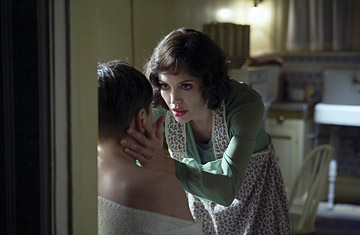
Angelina Jolie stars in Clint Eastwood's Changeling, written by J. Michael Straczynski.
Creator and writer of the influential 1990's space television show Babylon 5 and long-time writer for Marvel Comics, J. Michael Straczynski scored some impressive co-workers for his first feature film screenplay. Changeling, directed by Clint Eastwood, stars Angelina Jolie and John Malkovich. Straczynski spoke to TIME about writing for the big screen and why he's not ashamed that his house looks like a 14-year old's crash pad.
Briefly, what's the film about?
It's the story of a woman whose child went missing. The police couldn't find him for months, and they got a report that the boy had been found in Illinois. They brought the kid back, but it turns out that it wasn't the right kid. They had invested so much into having a happy ending for the story that they couldn't acknowledge their mistake. The story follows Angelina Jolie's character trying to convince the police to admit their wrong.
How much of it is true?
It's all a true story. Every bit of it. We wanted to go from "Based on a True Story" to "A True Story" in the credits. To do that, I had to work with Universal Studio's legal department and go through every single scene and provide attribution. Every single scene in that film can be traced to something. I spent a year researching this thing and ended up with 6,000 pages of documentation.
You used to be a journalist. Did that training come in handy here?
It was hugely important. Usually, when you're asked to tell a true story in film, there's already an article or something where the leg work's been done. In this case, there was nothing available. It was all primary research—City Hall archives, county courthouse archives, criminal records, hospital records. I just sifted through stuff, often spending a whole day paging through records just to find one reference.
Most people aren't familiar with the word changeling. Where does that come from?
It's a medieval term for one child, often a demon child, substituted for another. The downside of the word is that it has this supernatural connotation. I used it as a temporary title, figuring that I could always change it down the road, but everyone seemed to like it.
You've written for TV, for movies, for radio, for comics. Aside from the technical aspects, is it that different to write for all these mediums?
Not really. A story is a story is a story. The only difference is in the techniques you bring to bear. There are always limitations on what you can and can't do. But I enjoy that. Just like when you write a sonnet or haiku, there are rules you have to abide by. And to me, playing within the rules is the fun part. It keeps the brain fresh.
You created and wrote most of Babylon 5, which was one of the first TV shows to have a long, multi-season story arc planned out in advance. Now shows like The Wire or Lost are doing the same thing. Are you happy with the show's legacy?
We really opened the doors for a lot of shows that followed, creating the notion of a multi-year arc, which really hadn't been done before. You always used to hit the reset button at the end of an episode, because there was a sense that audiences couldn't follow stories across four episodes, let alone four years. We sort of proved that they could.
You've been writing for Marvel Comics for a while—doing Spider-Man, The Fantastic Four—in the midst of doing all these other things. What's the appeal?
It's not something that pays a whole lot of money, but I don't do it for that. I do it for the love of the form. I grew up on comics and cartoons. So, as an adult, I like comics and cartoons. My house looks like it was decorated by a 14-year old with a platinum American Express card. You should do what you enjoy doing, what brings you passion. As kids, we spontaneously sing and dance and tell stories, and along the way, someone comes and says, "No. You shouldn't be doing that." And we slowly begin to unlearn our passions. I think you have to hold on to those things.
